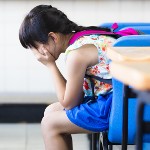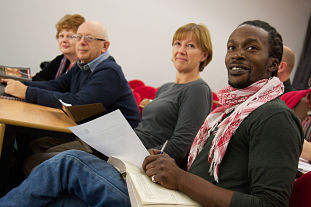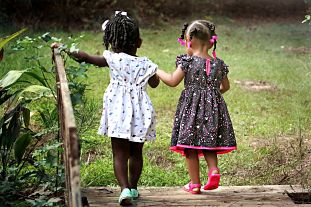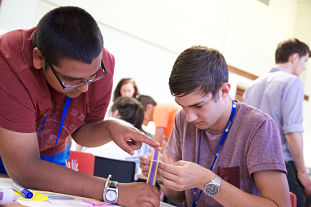-
 The rapid rise of food banks in schools: lessons for policy and practice
The rapid rise of food banks in schools: lessons for policy and practice
3.5 million school children in the UK live in food insecure households. Food insecurity is when people have ‘limited or uncertain availability of nutritionally adequate and safe food or having to acquire foods in socially unacceptable ways’ (Anderson 1990: 1560). Food insecurity negatively influences children’s educational and social outcomes.
-
 Impact of Special Educational Needs identification on academic attainment in Wales
Impact of Special Educational Needs identification on academic attainment in Wales
The Welsh SEN/ALN system is currently transitioning to a new statutory support system for those aged 0-25 years with a learning difficulty or disability. The transition phase started in 2022 and involves an overhaul of the system for learners with additional learning needs (ALN), the term that now replaces ‘special educational needs’ (SEN). This introduces a unified legislative framework for children and young people across the broader age range of 0-25 years and replaces statements with individual development plans (IDPs). However, there is currently no rigorous large-scale evaluation of how the previous system was working to support learners identified with SEN academically.
-
 Progress 8 cannot be calculated for 2025 and 2026, and any proxy measure is likely to be a poor substitute
Progress 8 cannot be calculated for 2025 and 2026, and any proxy measure is likely to be a poor substitute
Progress 8 is the Department for Education’s (DfE) headline secondary school accountability measure, and Progress 8 scores are published annually in national school performance tables.
-
Improving language learning and integration outcomes for adult migrant and refugee learners of English
Many migrants and refugees in the UK face disadvantage and discrimination, and there is growing anti-migrant sentiment in some sections of the population. Policy and public discussions surrounding migrant integration tend to focus on the individual responsibilities of migrants and refugees to improve their English skills, and to adapt their social and cultural practices. Yet migrant and refugee non-expert speakers of English can encounter multiple barriers to learning the English language and achieving their potential in Britain.
-
 Supporting children’s physical activity beyond the COVID-19 pandemic
Supporting children’s physical activity beyond the COVID-19 pandemic
Physical activity is central to the future health of the nation and preventative healthcare strategies. Active children are more likely to become active adults, and childhood is a key
period for developing physical skills and confidence.
-
 Children who fail to meet UK dietary guidelines have worse cardiometabolic health as young adults
Children who fail to meet UK dietary guidelines have worse cardiometabolic health as young adults
In the UK, heart and circulatory diseases contribute to a quarter of all deaths, and almost a third of these are classed as premature. Unhealthy diets are a key modifiable risk factor involved in the development of cardiovascular disease (CVD).
-
 What happens when migrant pupils turn 16?: A scoping study of 16+ provision for young migrants in the UK
What happens when migrant pupils turn 16?: A scoping study of 16+ provision for young migrants in the UK
We investigated what happens when young people reach the end of compulsory schooling at age 16 and don’t have the English proficiency skills to continue further study. Many go to college to continue their education but find themselves taking English classes as long as they have funding to do so (this typically runs out after three years).
-
 Let’s talk about death: All children in England should receive grief education at school
Let’s talk about death: All children in England should receive grief education at school
Nearly all British children experience a bereavement by the age of sixteen. An estimated 16,100 children experienced the death of a parent from COVID-19 associated causes between March 2020 and February 2023. Through news and social media, young people are exposed to more conversations about death than ever before.
-
 The skills required for the ‘smart local energy systems’ of the future need new approaches to training and qualifications.
The skills required for the ‘smart local energy systems’ of the future need new approaches to training and qualifications.
To support the UK Government’s net zero commitment, the energy system must become increasingly decarbonised, digitalised and localised and the skills required to develop, install and operate its components are changing.
-
 Climate Change education: A “world-leading strategy” would benefit from being research-informed
Climate Change education: A “world-leading strategy” would benefit from being research-informed
On April 21st, the DfE published its education strategy for England on sustainability and climate change. This envisions that, by 2030, “the United Kingdom is the world-leading education sector in sustainability and climate change” – but how does the current content of the strategy match up to local and global opinions of what’s needed?
-
 ‘We shouldn’t have to shout to be heard’: Valuing Parents as Experts
‘We shouldn’t have to shout to be heard’: Valuing Parents as Experts
Image credit: Becky Whitmore
-
 Diary Toolkit should be rolled out in schools to support teacher wellbeing
Diary Toolkit should be rolled out in schools to support teacher wellbeing
The Department for Education (DfE) has recognised that provision for staff and pupil wellbeing must be enhanced and has committed extra funds to improving pupil and teacher wellbeing and providing expert mental health support. The Reimagining the Diary project (RtD) shows that a flexible, creative approach to diary-keeping, alongside engagement with a Continuing Professional Development (CPD) community, is an effective tool for improving teachers’ wellbeing, on both a personal and professional level. This leads to educators who are equipped with healthy wellbeing practices, increasing their resilience and making them more likely to stay in the profession. Further positive outcomes are better communication and creative approaches to problem solving. This reflective diary-keeping experience has benefits for the entire school community through enhanced workplace relations and enriched teaching practice, leading to better outcomes for students.
-
 Is it worth calculating Progress 8 anymore?
Is it worth calculating Progress 8 anymore?
England’s secondary schools are held accountable for their performance by the Department for Education’s (DfE) ‘Progress 8’ performance measure. This measures the average pupil progress made between Key Stage 2 (age 11) and GCSEs (age 16) and represented a long-called-for improvement over the previous raw attainment measure. Nevertheless, concerns have been voiced as to how valid Progress 8 is for holding schools to account, with implications for the policymakers, schools, and parents who use Progress 8 to inform decision making around schools.
-
 Risks of childhood statelessness for the children associated with alleged ‘foreign fighters’ detained in Syria and Iraq
Risks of childhood statelessness for the children associated with alleged ‘foreign fighters’ detained in Syria and Iraq
This briefing is published and authored by Dr Rachel Pougnet (University of Bristol) and the European Network on Statelessness (ENS), as part of an ESRC-funded Knowledge
Exchange Partnership in 2020-2021 addressing risks of statelessness posed by current deprivation of nationality practices in Europe. ENS and Dr Rachel Pougnet are grateful
for the contributions of the three country experts involved in the research: Philomène Franssen (France), Alison Harvey (United Kingdom), and Professor René DeGroot (Netherlands).
-
 Seen but not heard: addressing the silent epidemic of child maltreatment in India
Seen but not heard: addressing the silent epidemic of child maltreatment in India
The United Nations Sustainable Development Goals 2030 calls for a reduction in exposure or experience of any form of child abuse and neglect., particularly in children from lower- and middle income countries. The term ‘child maltreatment’ encompasses physical, emotional, and/or sexual abuse, and physical and emotional neglect.
-
Not on the Buses: reduce inequality by subsidising bus travel for Bristolian children
In October 2017, Mia, then aged 11, told the audience at Bristol’s Festival of the Future City:
“My family don’t own a car and the bus fares are so expensive. Lots of people can’t get into Bristol to experience the city centre. Some children have never been into Bristol yet they only live a few miles away. So I want to ask you: how can children grow up and enjoy their cities if they can’t get around them? Is it fair that some children can’t do this at all?”
-
 Responding to child neglect in schools: messages for inter-agency safeguarding practice
Responding to child neglect in schools: messages for inter-agency safeguarding practice
This policy report includes recommendations for staff in schools and social workers in child protection services, as well as broader messages for staff in other agencies that work closely with statutory services to safeguard children.
-
 Children in Need and Children in Care: Educational Attainment and Progress
Children in Need and Children in Care: Educational Attainment and Progress
Research shows that the educational attainments of Children in Need (CIN) and Children in Care (CIC) in England are significantly lower than for other pupils. This represents sizeable numbers of children: the latest figures (March 2019) showed that there were 399,500 Children in Need in England and 78,150 Children in Care. The ‘attainment gap’ between these groups and other children (without special educational needs) in reaching expected standards is approximately 25-30% at Key Stage 1 (aged 7) and KS2 (aged 11), and 25% at KS4 (aged 16).
Researchers have often investigated the education of Children in Care; however, Children in Need have received very little attention. This project aimed to identify factors that help explain this ‘attainment gap’ for Children in Need and Children in Care.
-
 How depression relates to academic achievement in adolescence and early adulthood: identifying high risk points
How depression relates to academic achievement in adolescence and early adulthood: identifying high risk points
It is increasingly recognised that depression and poor educational achievement are connected, but how they are connected remains poorly understood, making it hard for policymakers to address the issue.
-
 Higher Education in South Africa: addressing inequalities experienced by students from rural contexts
Higher Education in South Africa: addressing inequalities experienced by students from rural contexts
Significant inequalities in access and participation continue to be major challenges for higher education in South Africa, including representation, academic achievement and completion rates.
-
 Common Cause: action needed to create fair and mutual research partnerships between universities and Black and Minority Ethnic Communities
Common Cause: action needed to create fair and mutual research partnerships between universities and Black and Minority Ethnic Communities
In the UK, Black and Minority Ethnic (BAME) groups are under-represented in all areas of research-intensive universities and in research leadership roles in higher education. Action needs to be taken to address this, and such action necessarily includes widening participation, action on the curriculum, and attention to structural inequalities within the university. The Common Cause project focused on addressing this inequality in research.
-
 Academy Trusts need better support to promote health
Academy Trusts need better support to promote health
Over half of pupils in England now attend an academy school (1). Health and educational outcomes are known to be inextricably linked. Healthy children and young people obtain better educational outcomes which, in turn, are associated with better life long health. Schools are key settings for health promotion but this study reveals variability across academies in how student health is prioritised.
-
 Universities should review support, assessment and contextual offers for widening participation students
Universities should review support, assessment and contextual offers for widening participation students
Value-added measures of educational effectiveness provide indicators of the extra value that is added by schools to student attainment over and above the progress or improvement that might normally be expected.
-
 Universities should be accessible to everyone, with lifelong learning at the heart of their work
Universities should be accessible to everyone, with lifelong learning at the heart of their work
This research, which draws on the authors’ experience of creating courses that recruit students without qualifications, offers practical policy solutions that would make universities more accessible and more responsive to a changing economy.
-
 The Government’s Progress 8 school performance measure needs to account for pupil background
The Government’s Progress 8 school performance measure needs to account for pupil background
Progress 8 is the Department for Education’s (DfE) headline measure of the average academic progress pupils make in each school over secondary schooling.
The measure adjusts pupils’ GCSE results for their end of primary schooling Key Stage 2 test results.
The DfE and Ofsted both rely heavily on Progress 8 to hold schools to account.
-
 Fetal alcohol spectrum disorder: prevention, identification and support need more resources
Fetal alcohol spectrum disorder: prevention, identification and support need more resources
Up to 17 per cent of UK children could have symptoms consistent with fetal alcohol spectrum disorder (FASD). Before this study no UK estimates existed.
-
 Enhancing the integration of Pakistani migrant husbands
Enhancing the integration of Pakistani migrant husbands
The integration of Pakistani spousal migrants is a key concern in two recent policy documents: the 2016 Casey Review, and the 2018 Integrated Communities Strategy White Paper.
-
 Transnationalizing Modern Languages: Reframing language education for a global future
Transnationalizing Modern Languages: Reframing language education for a global future
In a world that is changing with increasing rapidity, is our approach to the study of languages and cultures adequate to the challenges we face?
-
 Encounter, conversation and interaction: Improving community relations through religious education
Encounter, conversation and interaction: Improving community relations through religious education
Schools and teachers are in a unique position to improve community relations. This briefing calls for policy changes in order to harness these opportunities.
-
 Children growing up in the care of relatives in the UK
Children growing up in the care of relatives in the UK
The family environment that children grow up in can greatly influence their outcomes in terms of development and wellbeing. Although most children in the UK still live with at least one parent, some are unable to live with their parents due to reasons such as neglect or abuse by parents, parental sickness or death, parents being in prison, family circumstances such as poverty, parental drug and alcohol abuse or mental health issues. The majority of these children live with relatives or friends, otherwise known as kinship care.
-
 Comparing Chilean school performance: improving fairness in the classification of schools
Comparing Chilean school performance: improving fairness in the classification of schools
In recent years Chile has introduced new school accountability mechanisms. This research examines primary and secondary school performance in context using value-added approaches.
-
 Widening access to university: Step change needed to support talented learners from disadvantaged backgrounds
Widening access to university: Step change needed to support talented learners from disadvantaged backgrounds
The choice of facilitating* subjects at A-level plays a crucial role in students’ ability to access Russell Group universities.
-
 Widening participation in the digital age: can online networks and technologies support underrepresented students in succeeding at university?
Widening participation in the digital age: can online networks and technologies support underrepresented students in succeeding at university?
Online social networking practices can support the retention and success of more diverse students at university.
-
 Registering children as British citizens: current laws require overhaul
Registering children as British citizens: current laws require overhaul
This research explores how the law on registering children as British citizens operates in reality.
-
 The success of ‘naming and shaming’: league tables have a positive impact on performance of schools and hospitals
The success of ‘naming and shaming’: league tables have a positive impact on performance of schools and hospitals
This research focuses on the impact of league tables on school and hospital performance.
-
 Extending initial teacher education to raise standards and improve teacher retention
Extending initial teacher education to raise standards and improve teacher retention
This research explores ways of improving initial teacher education to help solve the looming teacher supply “crisis”.
-
 Active after-school clubs are important for improving children’s physical activity
Active after-school clubs are important for improving children’s physical activity
This briefing highlights the finding that after-school is a key time for children to be physically active. It also identifies training for existing school staff as a potentially cost-effective way of increasing physical activity provision.
-
 Researchers and mathematics teachers must collaborate to overcome barriers to student participation in Higher Education
Researchers and mathematics teachers must collaborate to overcome barriers to student participation in Higher Education
Collaboration between researchers and mathematics teachers is essential if solutions are to be found for increasing participation in HE.
-
 Bursaries are an important component of widening participation in Higher Education and their funding should be maintained
Bursaries are an important component of widening participation in Higher Education and their funding should be maintained
Bursaries bring far-reaching benefits for students from disadvantaged backgrounds and should be maintained alongside outreach programmes.
-
 Children’s British Citizenship: exposing the barriers to registration
Children’s British Citizenship: exposing the barriers to registration
Under current law, children may be recognized as British Citizens even where they fail to meet specific criteria, in recognition of the fundamental importance of children’s welfare. However, in practice, significant barriers to citizenship exist.
-
 Another shake-up of school league tables: how should we measure and hold schools accountable for the progress of their pupils?
Another shake-up of school league tables: how should we measure and hold schools accountable for the progress of their pupils?
The new school progress measures continue to ignore the very large socioeconomic and demographic differences between schools which also drive results.
-
 Placed-based policy making: A Bristol case response to the early years workforce crisis
Placed-based policy making: A Bristol case response to the early years workforce crisis
The Early Childhood Education and Care (ECEC) sector is facing a workforce crisis marked by recruitment and retention challenges. Public spending is increasing (CIVTAS, 2024) with the unprecedented expansion of childcare entitlements announced in 2023, but this has added stress on an over-extended workforce.
-
 How do young refugees and their families encounter England’s education system?
How do young refugees and their families encounter England’s education system?
The fourth goal of the United Nations 2030 Agenda for Sustainable Development (SDG 4) aims to “ensure inclusive and equitable quality education” and opportunities for all (UN, 2016). Accordingly, young refugees in England are entitled to education and required to attend school in England.
However, there is limited information about the young refugees in England’s schools. Responsibility for refugees’ education sits with local authorities meaning there is limited information about the young refugees in England’s schools nationally.
-
 The Benefits of Hindsight: Reconsidering higher education choices
The Benefits of Hindsight: Reconsidering higher education choices
Findings reveal that a large proportion of UK undergraduates and an even larger proportion of graduates think that with hindsight they would have made a different decision as to what and where to study.
 The rapid rise of food banks in schools: lessons for policy and practice
3.5 million school children in the UK live in food insecure households. Food insecurity is when people have ‘limited or uncertain availability of nutritionally adequate and safe food or having to acquire foods in socially unacceptable ways’ (Anderson 1990: 1560). Food insecurity negatively influences children’s educational and social outcomes.
The rapid rise of food banks in schools: lessons for policy and practice
3.5 million school children in the UK live in food insecure households. Food insecurity is when people have ‘limited or uncertain availability of nutritionally adequate and safe food or having to acquire foods in socially unacceptable ways’ (Anderson 1990: 1560). Food insecurity negatively influences children’s educational and social outcomes. Impact of Special Educational Needs identification on academic attainment in Wales
The Welsh SEN/ALN system is currently transitioning to a new statutory support system for those aged 0-25 years with a learning difficulty or disability. The transition phase started in 2022 and involves an overhaul of the system for learners with additional learning needs (ALN), the term that now replaces ‘special educational needs’ (SEN). This introduces a unified legislative framework for children and young people across the broader age range of 0-25 years and replaces statements with individual development plans (IDPs). However, there is currently no rigorous large-scale evaluation of how the previous system was working to support learners identified with SEN academically.
Impact of Special Educational Needs identification on academic attainment in Wales
The Welsh SEN/ALN system is currently transitioning to a new statutory support system for those aged 0-25 years with a learning difficulty or disability. The transition phase started in 2022 and involves an overhaul of the system for learners with additional learning needs (ALN), the term that now replaces ‘special educational needs’ (SEN). This introduces a unified legislative framework for children and young people across the broader age range of 0-25 years and replaces statements with individual development plans (IDPs). However, there is currently no rigorous large-scale evaluation of how the previous system was working to support learners identified with SEN academically. Progress 8 cannot be calculated for 2025 and 2026, and any proxy measure is likely to be a poor substitute
Progress 8 is the Department for Education’s (DfE) headline secondary school accountability measure, and Progress 8 scores are published annually in national school performance tables.
Progress 8 cannot be calculated for 2025 and 2026, and any proxy measure is likely to be a poor substitute
Progress 8 is the Department for Education’s (DfE) headline secondary school accountability measure, and Progress 8 scores are published annually in national school performance tables. Supporting children’s physical activity beyond the COVID-19 pandemic
Physical activity is central to the future health of the nation and preventative healthcare strategies. Active children are more likely to become active adults, and childhood is a key period for developing physical skills and confidence.
Supporting children’s physical activity beyond the COVID-19 pandemic
Physical activity is central to the future health of the nation and preventative healthcare strategies. Active children are more likely to become active adults, and childhood is a key period for developing physical skills and confidence. Children who fail to meet UK dietary guidelines have worse cardiometabolic health as young adults
In the UK, heart and circulatory diseases contribute to a quarter of all deaths, and almost a third of these are classed as premature. Unhealthy diets are a key modifiable risk factor involved in the development of cardiovascular disease (CVD).
Children who fail to meet UK dietary guidelines have worse cardiometabolic health as young adults
In the UK, heart and circulatory diseases contribute to a quarter of all deaths, and almost a third of these are classed as premature. Unhealthy diets are a key modifiable risk factor involved in the development of cardiovascular disease (CVD). What happens when migrant pupils turn 16?: A scoping study of 16+ provision for young migrants in the UK
We investigated what happens when young people reach the end of compulsory schooling at age 16 and don’t have the English proficiency skills to continue further study. Many go to college to continue their education but find themselves taking English classes as long as they have funding to do so (this typically runs out after three years).
What happens when migrant pupils turn 16?: A scoping study of 16+ provision for young migrants in the UK
We investigated what happens when young people reach the end of compulsory schooling at age 16 and don’t have the English proficiency skills to continue further study. Many go to college to continue their education but find themselves taking English classes as long as they have funding to do so (this typically runs out after three years). Let’s talk about death: All children in England should receive grief education at school
Nearly all British children experience a bereavement by the age of sixteen. An estimated 16,100 children experienced the death of a parent from COVID-19 associated causes between March 2020 and February 2023. Through news and social media, young people are exposed to more conversations about death than ever before.
Let’s talk about death: All children in England should receive grief education at school
Nearly all British children experience a bereavement by the age of sixteen. An estimated 16,100 children experienced the death of a parent from COVID-19 associated causes between March 2020 and February 2023. Through news and social media, young people are exposed to more conversations about death than ever before. The skills required for the ‘smart local energy systems’ of the future need new approaches to training and qualifications.
To support the UK Government’s net zero commitment, the energy system must become increasingly decarbonised, digitalised and localised and the skills required to develop, install and operate its components are changing.
The skills required for the ‘smart local energy systems’ of the future need new approaches to training and qualifications.
To support the UK Government’s net zero commitment, the energy system must become increasingly decarbonised, digitalised and localised and the skills required to develop, install and operate its components are changing. Climate Change education: A “world-leading strategy” would benefit from being research-informed
On April 21st, the DfE published its education strategy for England on sustainability and climate change. This envisions that, by 2030, “the United Kingdom is the world-leading education sector in sustainability and climate change” – but how does the current content of the strategy match up to local and global opinions of what’s needed?
Climate Change education: A “world-leading strategy” would benefit from being research-informed
On April 21st, the DfE published its education strategy for England on sustainability and climate change. This envisions that, by 2030, “the United Kingdom is the world-leading education sector in sustainability and climate change” – but how does the current content of the strategy match up to local and global opinions of what’s needed? ‘We shouldn’t have to shout to be heard’: Valuing Parents as Experts
Image credit: Becky Whitmore
‘We shouldn’t have to shout to be heard’: Valuing Parents as Experts
Image credit: Becky Whitmore Diary Toolkit should be rolled out in schools to support teacher wellbeing
The Department for Education (DfE) has recognised that provision for staff and pupil wellbeing must be enhanced and has committed extra funds to improving pupil and teacher wellbeing and providing expert mental health support. The Reimagining the Diary project (RtD) shows that a flexible, creative approach to diary-keeping, alongside engagement with a Continuing Professional Development (CPD) community, is an effective tool for improving teachers’ wellbeing, on both a personal and professional level. This leads to educators who are equipped with healthy wellbeing practices, increasing their resilience and making them more likely to stay in the profession. Further positive outcomes are better communication and creative approaches to problem solving. This reflective diary-keeping experience has benefits for the entire school community through enhanced workplace relations and enriched teaching practice, leading to better outcomes for students.
Diary Toolkit should be rolled out in schools to support teacher wellbeing
The Department for Education (DfE) has recognised that provision for staff and pupil wellbeing must be enhanced and has committed extra funds to improving pupil and teacher wellbeing and providing expert mental health support. The Reimagining the Diary project (RtD) shows that a flexible, creative approach to diary-keeping, alongside engagement with a Continuing Professional Development (CPD) community, is an effective tool for improving teachers’ wellbeing, on both a personal and professional level. This leads to educators who are equipped with healthy wellbeing practices, increasing their resilience and making them more likely to stay in the profession. Further positive outcomes are better communication and creative approaches to problem solving. This reflective diary-keeping experience has benefits for the entire school community through enhanced workplace relations and enriched teaching practice, leading to better outcomes for students. Is it worth calculating Progress 8 anymore?
England’s secondary schools are held accountable for their performance by the Department for Education’s (DfE) ‘Progress 8’ performance measure. This measures the average pupil progress made between Key Stage 2 (age 11) and GCSEs (age 16) and represented a long-called-for improvement over the previous raw attainment measure. Nevertheless, concerns have been voiced as to how valid Progress 8 is for holding schools to account, with implications for the policymakers, schools, and parents who use Progress 8 to inform decision making around schools.
Is it worth calculating Progress 8 anymore?
England’s secondary schools are held accountable for their performance by the Department for Education’s (DfE) ‘Progress 8’ performance measure. This measures the average pupil progress made between Key Stage 2 (age 11) and GCSEs (age 16) and represented a long-called-for improvement over the previous raw attainment measure. Nevertheless, concerns have been voiced as to how valid Progress 8 is for holding schools to account, with implications for the policymakers, schools, and parents who use Progress 8 to inform decision making around schools. Risks of childhood statelessness for the children associated with alleged ‘foreign fighters’ detained in Syria and Iraq
This briefing is published and authored by Dr Rachel Pougnet (University of Bristol) and the European Network on Statelessness (ENS), as part of an ESRC-funded Knowledge Exchange Partnership in 2020-2021 addressing risks of statelessness posed by current deprivation of nationality practices in Europe. ENS and Dr Rachel Pougnet are grateful for the contributions of the three country experts involved in the research: Philomène Franssen (France), Alison Harvey (United Kingdom), and Professor René DeGroot (Netherlands).
Risks of childhood statelessness for the children associated with alleged ‘foreign fighters’ detained in Syria and Iraq
This briefing is published and authored by Dr Rachel Pougnet (University of Bristol) and the European Network on Statelessness (ENS), as part of an ESRC-funded Knowledge Exchange Partnership in 2020-2021 addressing risks of statelessness posed by current deprivation of nationality practices in Europe. ENS and Dr Rachel Pougnet are grateful for the contributions of the three country experts involved in the research: Philomène Franssen (France), Alison Harvey (United Kingdom), and Professor René DeGroot (Netherlands). Seen but not heard: addressing the silent epidemic of child maltreatment in India
The United Nations Sustainable Development Goals 2030 calls for a reduction in exposure or experience of any form of child abuse and neglect., particularly in children from lower- and middle income countries. The term ‘child maltreatment’ encompasses physical, emotional, and/or sexual abuse, and physical and emotional neglect.
Seen but not heard: addressing the silent epidemic of child maltreatment in India
The United Nations Sustainable Development Goals 2030 calls for a reduction in exposure or experience of any form of child abuse and neglect., particularly in children from lower- and middle income countries. The term ‘child maltreatment’ encompasses physical, emotional, and/or sexual abuse, and physical and emotional neglect. Responding to child neglect in schools: messages for inter-agency safeguarding practice
This policy report includes recommendations for staff in schools and social workers in child protection services, as well as broader messages for staff in other agencies that work closely with statutory services to safeguard children.
Responding to child neglect in schools: messages for inter-agency safeguarding practice
This policy report includes recommendations for staff in schools and social workers in child protection services, as well as broader messages for staff in other agencies that work closely with statutory services to safeguard children. Children in Need and Children in Care: Educational Attainment and Progress
Research shows that the educational attainments of Children in Need (CIN) and Children in Care (CIC) in England are significantly lower than for other pupils. This represents sizeable numbers of children: the latest figures (March 2019) showed that there were 399,500 Children in Need in England and 78,150 Children in Care. The ‘attainment gap’ between these groups and other children (without special educational needs) in reaching expected standards is approximately 25-30% at Key Stage 1 (aged 7) and KS2 (aged 11), and 25% at KS4 (aged 16). Researchers have often investigated the education of Children in Care; however, Children in Need have received very little attention. This project aimed to identify factors that help explain this ‘attainment gap’ for Children in Need and Children in Care.
Children in Need and Children in Care: Educational Attainment and Progress
Research shows that the educational attainments of Children in Need (CIN) and Children in Care (CIC) in England are significantly lower than for other pupils. This represents sizeable numbers of children: the latest figures (March 2019) showed that there were 399,500 Children in Need in England and 78,150 Children in Care. The ‘attainment gap’ between these groups and other children (without special educational needs) in reaching expected standards is approximately 25-30% at Key Stage 1 (aged 7) and KS2 (aged 11), and 25% at KS4 (aged 16). Researchers have often investigated the education of Children in Care; however, Children in Need have received very little attention. This project aimed to identify factors that help explain this ‘attainment gap’ for Children in Need and Children in Care. How depression relates to academic achievement in adolescence and early adulthood: identifying high risk points
It is increasingly recognised that depression and poor educational achievement are connected, but how they are connected remains poorly understood, making it hard for policymakers to address the issue.
How depression relates to academic achievement in adolescence and early adulthood: identifying high risk points
It is increasingly recognised that depression and poor educational achievement are connected, but how they are connected remains poorly understood, making it hard for policymakers to address the issue. Higher Education in South Africa: addressing inequalities experienced by students from rural contexts
Significant inequalities in access and participation continue to be major challenges for higher education in South Africa, including representation, academic achievement and completion rates.
Higher Education in South Africa: addressing inequalities experienced by students from rural contexts
Significant inequalities in access and participation continue to be major challenges for higher education in South Africa, including representation, academic achievement and completion rates. Common Cause: action needed to create fair and mutual research partnerships between universities and Black and Minority Ethnic Communities
In the UK, Black and Minority Ethnic (BAME) groups are under-represented in all areas of research-intensive universities and in research leadership roles in higher education. Action needs to be taken to address this, and such action necessarily includes widening participation, action on the curriculum, and attention to structural inequalities within the university. The Common Cause project focused on addressing this inequality in research.
Common Cause: action needed to create fair and mutual research partnerships between universities and Black and Minority Ethnic Communities
In the UK, Black and Minority Ethnic (BAME) groups are under-represented in all areas of research-intensive universities and in research leadership roles in higher education. Action needs to be taken to address this, and such action necessarily includes widening participation, action on the curriculum, and attention to structural inequalities within the university. The Common Cause project focused on addressing this inequality in research. Academy Trusts need better support to promote health
Over half of pupils in England now attend an academy school (1). Health and educational outcomes are known to be inextricably linked. Healthy children and young people obtain better educational outcomes which, in turn, are associated with better life long health. Schools are key settings for health promotion but this study reveals variability across academies in how student health is prioritised.
Academy Trusts need better support to promote health
Over half of pupils in England now attend an academy school (1). Health and educational outcomes are known to be inextricably linked. Healthy children and young people obtain better educational outcomes which, in turn, are associated with better life long health. Schools are key settings for health promotion but this study reveals variability across academies in how student health is prioritised. Universities should review support, assessment and contextual offers for widening participation students
Value-added measures of educational effectiveness provide indicators of the extra value that is added by schools to student attainment over and above the progress or improvement that might normally be expected.
Universities should review support, assessment and contextual offers for widening participation students
Value-added measures of educational effectiveness provide indicators of the extra value that is added by schools to student attainment over and above the progress or improvement that might normally be expected. Universities should be accessible to everyone, with lifelong learning at the heart of their work
This research, which draws on the authors’ experience of creating courses that recruit students without qualifications, offers practical policy solutions that would make universities more accessible and more responsive to a changing economy.
Universities should be accessible to everyone, with lifelong learning at the heart of their work
This research, which draws on the authors’ experience of creating courses that recruit students without qualifications, offers practical policy solutions that would make universities more accessible and more responsive to a changing economy. The Government’s Progress 8 school performance measure needs to account for pupil background
Progress 8 is the Department for Education’s (DfE) headline measure of the average academic progress pupils make in each school over secondary schooling. The measure adjusts pupils’ GCSE results for their end of primary schooling Key Stage 2 test results. The DfE and Ofsted both rely heavily on Progress 8 to hold schools to account.
The Government’s Progress 8 school performance measure needs to account for pupil background
Progress 8 is the Department for Education’s (DfE) headline measure of the average academic progress pupils make in each school over secondary schooling. The measure adjusts pupils’ GCSE results for their end of primary schooling Key Stage 2 test results. The DfE and Ofsted both rely heavily on Progress 8 to hold schools to account. Fetal alcohol spectrum disorder: prevention, identification and support need more resources
Up to 17 per cent of UK children could have symptoms consistent with fetal alcohol spectrum disorder (FASD). Before this study no UK estimates existed.
Fetal alcohol spectrum disorder: prevention, identification and support need more resources
Up to 17 per cent of UK children could have symptoms consistent with fetal alcohol spectrum disorder (FASD). Before this study no UK estimates existed. Enhancing the integration of Pakistani migrant husbands
The integration of Pakistani spousal migrants is a key concern in two recent policy documents: the 2016 Casey Review, and the 2018 Integrated Communities Strategy White Paper.
Enhancing the integration of Pakistani migrant husbands
The integration of Pakistani spousal migrants is a key concern in two recent policy documents: the 2016 Casey Review, and the 2018 Integrated Communities Strategy White Paper. Transnationalizing Modern Languages: Reframing language education for a global future
In a world that is changing with increasing rapidity, is our approach to the study of languages and cultures adequate to the challenges we face?
Transnationalizing Modern Languages: Reframing language education for a global future
In a world that is changing with increasing rapidity, is our approach to the study of languages and cultures adequate to the challenges we face? Encounter, conversation and interaction: Improving community relations through religious education
Schools and teachers are in a unique position to improve community relations. This briefing calls for policy changes in order to harness these opportunities.
Encounter, conversation and interaction: Improving community relations through religious education
Schools and teachers are in a unique position to improve community relations. This briefing calls for policy changes in order to harness these opportunities. Children growing up in the care of relatives in the UK
The family environment that children grow up in can greatly influence their outcomes in terms of development and wellbeing. Although most children in the UK still live with at least one parent, some are unable to live with their parents due to reasons such as neglect or abuse by parents, parental sickness or death, parents being in prison, family circumstances such as poverty, parental drug and alcohol abuse or mental health issues. The majority of these children live with relatives or friends, otherwise known as kinship care.
Children growing up in the care of relatives in the UK
The family environment that children grow up in can greatly influence their outcomes in terms of development and wellbeing. Although most children in the UK still live with at least one parent, some are unable to live with their parents due to reasons such as neglect or abuse by parents, parental sickness or death, parents being in prison, family circumstances such as poverty, parental drug and alcohol abuse or mental health issues. The majority of these children live with relatives or friends, otherwise known as kinship care. Comparing Chilean school performance: improving fairness in the classification of schools
In recent years Chile has introduced new school accountability mechanisms. This research examines primary and secondary school performance in context using value-added approaches.
Comparing Chilean school performance: improving fairness in the classification of schools
In recent years Chile has introduced new school accountability mechanisms. This research examines primary and secondary school performance in context using value-added approaches. Widening access to university: Step change needed to support talented learners from disadvantaged backgrounds
The choice of facilitating* subjects at A-level plays a crucial role in students’ ability to access Russell Group universities.
Widening access to university: Step change needed to support talented learners from disadvantaged backgrounds
The choice of facilitating* subjects at A-level plays a crucial role in students’ ability to access Russell Group universities. Widening participation in the digital age: can online networks and technologies support underrepresented students in succeeding at university?
Online social networking practices can support the retention and success of more diverse students at university.
Widening participation in the digital age: can online networks and technologies support underrepresented students in succeeding at university?
Online social networking practices can support the retention and success of more diverse students at university. Registering children as British citizens: current laws require overhaul
This research explores how the law on registering children as British citizens operates in reality.
Registering children as British citizens: current laws require overhaul
This research explores how the law on registering children as British citizens operates in reality. The success of ‘naming and shaming’: league tables have a positive impact on performance of schools and hospitals
This research focuses on the impact of league tables on school and hospital performance.
The success of ‘naming and shaming’: league tables have a positive impact on performance of schools and hospitals
This research focuses on the impact of league tables on school and hospital performance. Extending initial teacher education to raise standards and improve teacher retention
This research explores ways of improving initial teacher education to help solve the looming teacher supply “crisis”.
Extending initial teacher education to raise standards and improve teacher retention
This research explores ways of improving initial teacher education to help solve the looming teacher supply “crisis”. Active after-school clubs are important for improving children’s physical activity
This briefing highlights the finding that after-school is a key time for children to be physically active. It also identifies training for existing school staff as a potentially cost-effective way of increasing physical activity provision.
Active after-school clubs are important for improving children’s physical activity
This briefing highlights the finding that after-school is a key time for children to be physically active. It also identifies training for existing school staff as a potentially cost-effective way of increasing physical activity provision. Researchers and mathematics teachers must collaborate to overcome barriers to student participation in Higher Education
Collaboration between researchers and mathematics teachers is essential if solutions are to be found for increasing participation in HE.
Researchers and mathematics teachers must collaborate to overcome barriers to student participation in Higher Education
Collaboration between researchers and mathematics teachers is essential if solutions are to be found for increasing participation in HE. Bursaries are an important component of widening participation in Higher Education and their funding should be maintained
Bursaries bring far-reaching benefits for students from disadvantaged backgrounds and should be maintained alongside outreach programmes.
Bursaries are an important component of widening participation in Higher Education and their funding should be maintained
Bursaries bring far-reaching benefits for students from disadvantaged backgrounds and should be maintained alongside outreach programmes. Children’s British Citizenship: exposing the barriers to registration
Under current law, children may be recognized as British Citizens even where they fail to meet specific criteria, in recognition of the fundamental importance of children’s welfare. However, in practice, significant barriers to citizenship exist.
Children’s British Citizenship: exposing the barriers to registration
Under current law, children may be recognized as British Citizens even where they fail to meet specific criteria, in recognition of the fundamental importance of children’s welfare. However, in practice, significant barriers to citizenship exist. Another shake-up of school league tables: how should we measure and hold schools accountable for the progress of their pupils?
The new school progress measures continue to ignore the very large socioeconomic and demographic differences between schools which also drive results.
Another shake-up of school league tables: how should we measure and hold schools accountable for the progress of their pupils?
The new school progress measures continue to ignore the very large socioeconomic and demographic differences between schools which also drive results. Placed-based policy making: A Bristol case response to the early years workforce crisis
The Early Childhood Education and Care (ECEC) sector is facing a workforce crisis marked by recruitment and retention challenges. Public spending is increasing (CIVTAS, 2024) with the unprecedented expansion of childcare entitlements announced in 2023, but this has added stress on an over-extended workforce.
Placed-based policy making: A Bristol case response to the early years workforce crisis
The Early Childhood Education and Care (ECEC) sector is facing a workforce crisis marked by recruitment and retention challenges. Public spending is increasing (CIVTAS, 2024) with the unprecedented expansion of childcare entitlements announced in 2023, but this has added stress on an over-extended workforce. How do young refugees and their families encounter England’s education system?
The fourth goal of the United Nations 2030 Agenda for Sustainable Development (SDG 4) aims to “ensure inclusive and equitable quality education” and opportunities for all (UN, 2016). Accordingly, young refugees in England are entitled to education and required to attend school in England. However, there is limited information about the young refugees in England’s schools. Responsibility for refugees’ education sits with local authorities meaning there is limited information about the young refugees in England’s schools nationally.
How do young refugees and their families encounter England’s education system?
The fourth goal of the United Nations 2030 Agenda for Sustainable Development (SDG 4) aims to “ensure inclusive and equitable quality education” and opportunities for all (UN, 2016). Accordingly, young refugees in England are entitled to education and required to attend school in England. However, there is limited information about the young refugees in England’s schools. Responsibility for refugees’ education sits with local authorities meaning there is limited information about the young refugees in England’s schools nationally. The Benefits of Hindsight: Reconsidering higher education choices
Findings reveal that a large proportion of UK undergraduates and an even larger proportion of graduates think that with hindsight they would have made a different decision as to what and where to study.
The Benefits of Hindsight: Reconsidering higher education choices
Findings reveal that a large proportion of UK undergraduates and an even larger proportion of graduates think that with hindsight they would have made a different decision as to what and where to study.